Tue 7 Dec 2021
A Movie Review by David Friend: MAN ON THE RUN (1949).
Posted by Steve under Films: Drama/Romance , Reviews[10] Comments
MAN ON THE RUN. Associated British-Pathé, UK, 1949. Stratford Pictures, US, 1951. Derek Farr, Joan Hopkins, Edward Chapman, Laurence Harvey, Howard Marion-Crawford, Kenneth More. Written & directed by Lawrence Huntington.
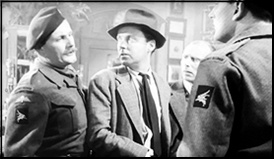
Peter Burden (Derek Farr) is an army deserter, one of twenty thousand British men who live in fear of imprisonment even after the war has ended. After having served four years, the authorities denied his request for compassionate leave in order to attend his mother’s deathbed and he absconded in disgust.
He is now working as a landlord of a country pub and is pulling pints when an old army acquaintance (Kenneth More) walks in and recognizes him. Corporal Newman is newly demobbed and, having found only low-paid work in the area, opportunistically blackmails Burden.
Terrified, Burden flees again, this time returning to London, where a lack of funds and the late rent on a ragged bedsit force him to try and pawn his old service revolver. At the jeweller’s, however, two armed robbers arrive and promptly kill a copper, with Burdon believed to be part of the gang.
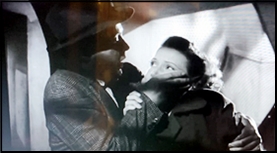
His attempts to elude the police become more perilous than ever and a desperate escape sees him bounding breathlessly into the house of young widow Jean Adams (Joan Hopkins). Jean takes pity on the ex-soldier and agrees to help. The pair become determined to find the robbers, knowing only that one of them (Edward Underdown) is missing two fingers on his left hand.
All the while, they must avoid the grimly persistent Chief Inspector Mitchell (Edward Chapman) and Detective Sergeant Lawson (a young Laurence Harvey), who prove to be quite able pursuers…
Lawrence Huntington directed, produced and wrote this foray into near-noir which was presumably inspired by the many deserters still at large long after V.E. Day. His script carefully positions Burdon as a sympathetic figure (the name is well-chosen). The sad circumstances surrounding his desertion and the fact he had spent most of the war in combat is repeated at least once.
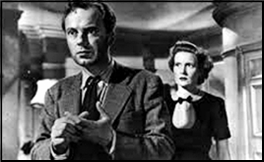
To steer clear from presenting him as a coward or a chancer was undoubtedly important as everyone in the audience would have known soldiers or might even have been one themselves. Huntington also has his protagonist plea for a more constructive solution to the problem, particularly when so many such people inevitably turn to crime to survive.
This situation, often forgotten today, makes Man on the Run interesting and slightly more nuanced than other chase thrillers, though it so solidly sides with Burdon that a more minute exploration of similar issues facing other such soldiers – for example, post-traumatic stress or the frustrating futility of war itself – is avoided altogether. There’s a sense that each man would have his own story, though nobody describes what those might be.
Derek Farr is excellent as Burdon: pained, thoughtful, and reluctant to enlist anyone else’s help. It’s a shame he didn’t have more of a career as he could easily have become a Kenneth More. More himself pops up early on, well before his middle-class every-man persona, like an English James Stewart in tweeds and a pipe, would lead him to become one of Britain’s biggest film stars.
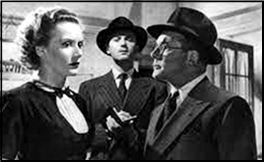
The police investigation, meanwhile, is headed by the sort of dogged, pipe-smoking detective familiar to pictures of this period, with Chapman’s chief inspector wry and astute enough to elicit tension. It’s this quietly humming, will-they-catch-him? element which carries the film, particularly in the excellent first half, though a thrilling set-piece of the sort included in The 39 Steps (which also had a bad guy deprived of a digit) or North By Northwest is unfortunately even more elusive than Burdon himself.
Particularly interesting for its glimpses of post-war life (from genuine London locations to a reference to radio’s proto-James Bond Dick Barton), plus some gently amusing moments, Man on the Run makes for an entertaining and compelling thriller which is much recommended.
Rating: ***1/2
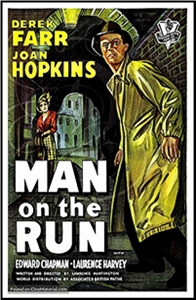
December 7th, 2021 at 9:36 pm
I agree whole heartedly, it is a well written, directed, and acted thriller, not great, but well within the bounds of the better British thrillers of the era.
I love the idea of More as a kind of British James Stewart. He would become perhaps the most personable and relatable of the British leading men of the period equally good at comedy and drama and starring in a remake of THE 39 STEPS that stands on its own and late in his career outstanding as an unlikely Father Brown.
He carved more than a place for himself in films like THE ADMIRABLE CRICHTON, GREENGAGE SUMMER, BRANDY FOR THE PARSON, GENEVIEVE, NORTHWEST FRONTIER, DARK OF THE SUN, SINK THE BISMARK, and in the Doctor in the House film series.
December 8th, 2021 at 12:19 am
That’s quite an impressive list of films. Not many actors can come even close to a resume such as that.
I was wondering if MAN ON THE RUN was one of his earlier roles, and according to IMDb, the answer is, far from it. His first appearance in a film was in 1935, when he was 21.
December 8th, 2021 at 5:38 am
As David notes, not great but not bad at all, and it was interesting seeing More and Harvey in pre-stardom parts.
December 8th, 2021 at 6:05 pm
I didn’t know, Steve, that More started so early! As David says above, a personable and relatable actor. His version ‘The 39 Steps’ is my favourite version, though I imagine I’m in the minority there.
Recently saw an early ’60s film of his – ‘The Comedy Man’ – a sombre drama in which he played an unemployed actor facing the prospect of abandoning his dreams of stardom.
Farr himself was also excellent in the very first episode of The Saint (‘The Talented Husband’).
December 8th, 2021 at 8:59 pm
David to David, it’s my favorite version of THE 39 STEPS too.
December 8th, 2021 at 9:28 pm
I will stick with Hitchock’s 1935 imagining, but it is probably not too much of a stretch to swing that to 1959 and North By Northwest.
December 9th, 2021 at 12:27 pm
I remember hearing that screenwriter Robert Towne wanted to remake 39 Steps himself.
His version would portray Hannay as a film star. In the film, this would mean that all movie posters would effectively double as ‘Wanted’ ones.
When the character first hears of the 39 Steps, he assumes it’s something to do with drug rehabilitation.
Nothing ever came of the project, though. A shame – being famous and on the run is a neat idea.
December 9th, 2021 at 9:42 pm
Barry, Both SABOTAGE and NORTH BY NORTHWEST are pretty much remakes of STEPS.
For my case I saw the More version a good fifteen years before being able to see the Hitchcock film so it and not the Donat/Carroll version was the standard.
David,
Richard Sale wrote a variation of that plot with an actor’s stunt double murdered and the actor forced to hunt for the killer while posing as the stunt double.
They are playing with the basic idea now in the MCU mini-series HAWKEYE on Disney with the hero trying to keep a low profile in New York while everyone recognizes him as an Avenger despite his lack of costume much to his chagrin.
I would love to have seen Towne’s version of that though.
December 9th, 2021 at 10:21 pm
David,
What I should have written was there are two versions that matter personally, the original and the Cary Grant, defined entirely by the actor and his personality.
December 11th, 2021 at 9:23 pm
NORTH BY NORTHWEST is far superior to any of the versions of STEPS, and really close to the same plot right down to some scenes from the Buchan book to the point that could not have been coincidence.
Hitch and Lehman added some modern Cold War touches, a bang up ending, and sexual tension fit for the time, along with a few twists.